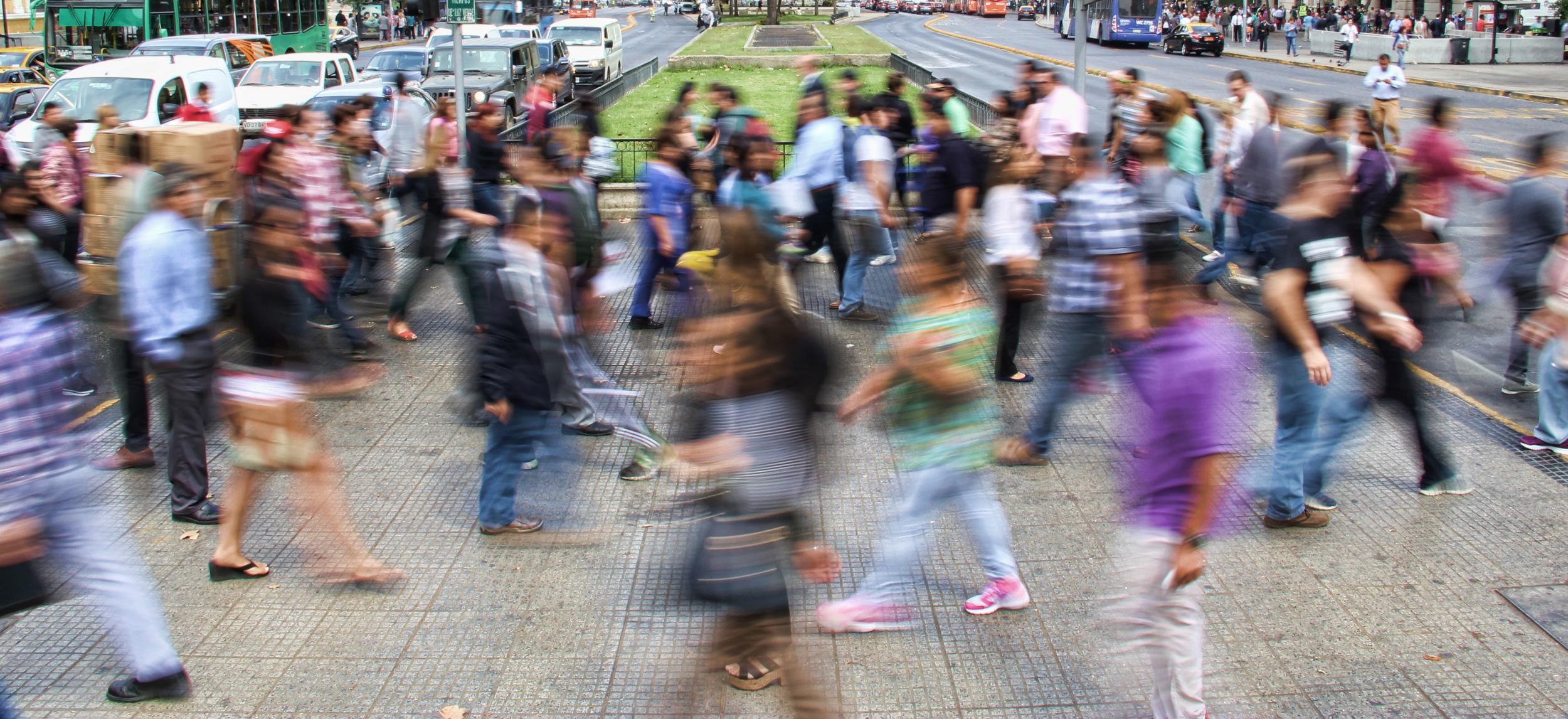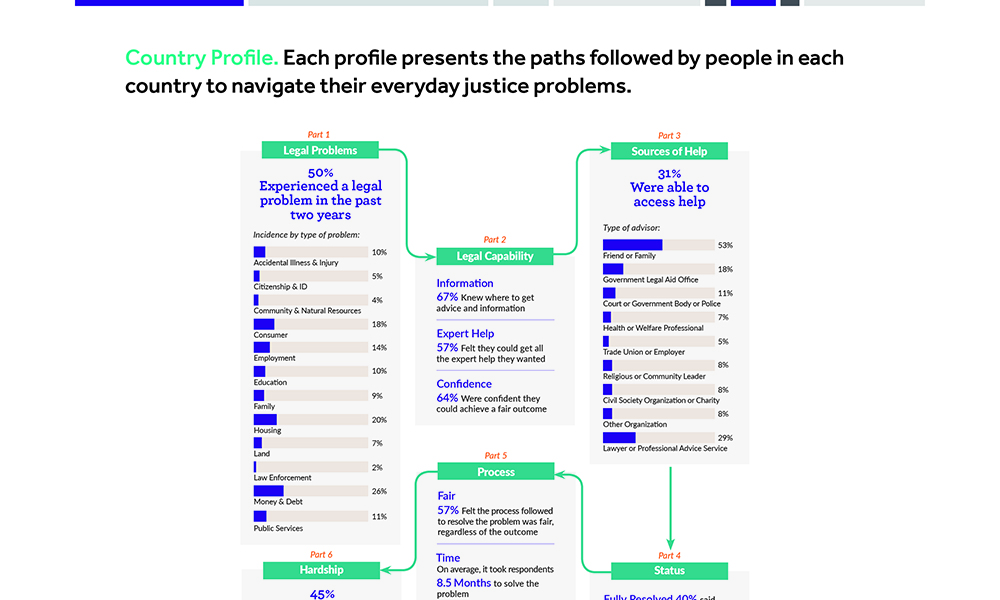

The Global Justice Gap
The United Nations Sustainable Development Goals lay out ambitious targets to guide global and national development policies through 2030, including target 16.3's promise to "ensure equal access to justice for all." However, as data on people's experience of justice grows, it is becoming increasingly clear that the world is not on track to meet this target.
Over the course of the last year, the World Justice Project (WJP) has led the first-ever effort to categorize and synthesize data on people's justice needs in order to assess the scale and nature of the global "justice gap" — i.e., the number of people who have at least one unmet justice need. Conducted in collaboration with the Justice Gap Working Group of the Task Force on Justice,i the justice gap assessment demonstrates that many people face justice problems, and too few get the justice they need for both everyday problems and severe injustices. The WJP estimates that:
- 1.5 billion people cannot obtain justice for civil, administrative, or criminal justice problems. These are victims of crime and people with civil and administrative justice needs who may live in contexts with functioning institutions and justice systems, but who face obstacles to resolving their everyday justice issues.
- 4.5 billion people are excluded from the opportunities the law provides. These are people who lack legal tools — including identity documents, land or housing tenure, and formal work arrangements — that allow them to protect their assets and access economic opportunities or public services to which they have a right.
- 253 million people live in extreme conditions of injustice. This includes people who are stateless, victims of modern slavery, and people who live in fragile states with high levels of insecurity.
When viewed in the aggregate, these figures amount to 5.1 billion people — or approximately two thirds of the world’s population — who face at least one of these justice issues, with many confronted by multiple injustices. While these injustices vary in severity and often overlap following systematic patterns of exclusion, this global justice gap reveals that the demand for justice is not being fulfilled for a majority of the world’s population. Closing the justice gap is therefore vital to realizing the broader development agenda and its vision of a "just, equitable, tolerant, open, and socially inclusive world in which the needs of the most vulnerable are met."ii
For more information on the measurement framework, data sources, and methods used to arrive at these justice gap estimates, please see Measuring the Justice Gap: A People-Centered Assessment of Unmet Justice Needs Around the World.
A Closer Look at Access to Civil Justice
An important portion of the global justice gap are the estimated 1.4 billion people who have unmet civil or administrative justice needs. A growing body of research confirms that a majority of people's everyday justice problems are civil rather than criminal in nature,iii and that the inability to resolve everyday civil and administrative problems diminishes individuals' participation in the economy, undermines their social and physical wellbeing, and reinforces the poverty trap.iv For this reason, the WJP has undertaken a global study on legal needs and access to justice in order to collect globally comparable data on the prevalence of everyday justice problems and the paths that people follow to navigate these problems.
Every year, the World Justice Project administers its General Population Poll (GPP) to collect data from representative samples of the general public around the world, which are used to compute the scores and rankings for the annual WJP Rule of Law Index®. Drawing on methodological guidance produced by the Organisation for Economic Co-operation and Development (OECD) and Open Society Justice Initiative (OSJI), the WJP developed a survey module on legal needs and access to justice for inclusion in the GPP, which builds on what is known in the literature as the "Paths to Justice" tradition. As part of the WJP's household data collection cycle, this module was administered to more than 100,000 households in 101 countries between 2017 and 2018. The resulting data tell us that:
- Justice problems are ubiquitous. Approximately half (49%) of people surveyed experienced a legal problem in the last two years. While the prevalence and severity of problems varies by country, the most common problems relate to consumer issues, housing, and money and debt.
- Most people do not turn to lawyers and courts. Less than a third (29%) of people who experience a legal problem seek any form of advice to help them better understand or resolve their problem, and those who do prefer to seek assistance from family members or friends. Even fewer (17%) take their problem to an authority or third party to mediate or adjudicate their problem, with most preferring to negotiate directly with the other party.
- People face a variety of obstacles to meeting their justice needs, beginning with their ability to recognize their problems as having a legal remedy. Indeed, fewer than 1 in 3 people (29%) understood their problem to be legal in nature as opposed to "bad luck" or a community matter. As mentioned above, less than a third of those surveyed obtained advice from a person or organization that could help them better understand or resolve their problem, and 1 in 6 (16%) reported that it was difficult or nearly impossible to find the money required to resolve their problem. About the same proportion (17%) report that their justice problem persists but they have given up any action to try to resolve it further, with another 39% reporting that their problem is still ongoing.
- Justice problems impact people's lives. 43% of those surveyed reported that their justice problem adversely impacted their life, with more than 1 in 4 people (29%) reporting that they experienced physical or stress-related ill health and more than 1 in 5 people (23%) reporting that they lost their job or had to relocate as a result of their legal problem.
On June 27, 2019, WJP will release its newest report, Global Insights on Access to Justice 2019, capturing comparable data on legal needs and public access to civil justice on a global scale, representing the voices of more than 100,000 people in 101 countries. The report is a follow-on to the research presented in WJP’s Global Insights on Access to Justice 2018, which presented data gathered for 45 countries polled as part of the WJP's global study on legal needs and access to justice. The 2019 report will show data for an additional 56 countries and will feature updated country profiles and downloadable summary statistics for all 101 countries polled in 2017 and 2018 that can serve as tools for policymakers, advocates, and researchers seeking to better understand the state of access to civil justice in the world.
The Path Forward
The WJP's justice gap assessment and global study on access to justice illustrate that realizing justice for all is a large and complex challenge. This challenge is being met with a groundswell of advocacy efforts, calling for the policy commitments, financing, and data required to ensure equal access to justice for all by 2030.
These efforts are currently focused on the opportunity presented in 2019 by the UN High-level Political Forum (HLPF) in July, where governments will review progress against Sustainable Development Goal (SDG) 16, which commits countries to "promote peaceful and inclusive societies for sustainable development, provide access to justice for all, and build effective, accountable and inclusive institutions at all levels." In September, heads of state will convene to review progress across all 17 SDGs at the quadrennial SDG Summit. Seizing this opportunity in the weeks and months ahead will require:
- Multi-stakeholder commitments to justice. Last month, WJP hosted the 2019 World Justice Forum, an important milestone for building a worldwide community dedicated to realizing justice for all. As a global meeting place for governmental and non-governmental actors, private sector leaders, and the donor community, the Forum addressed principal challenges to delivering justice and provided space for advancing concrete solutions. In response, governments, organizations, and individuals joined in showcasing their justice initiatives and Commitments to Justice at the conclusion of the World Justice Forum. These declarations of further action to accelerate implementation of SDG16 set the pace for outcomes that will feed directly into the HLPF in July and the UN Summit on the SDGs in September.
- Promoting effective, sustainable, and replicable approaches to closing the justice gap at the community level. Since its founding, WJP has provided over $1,000,000 to support initiatives on five continents, from improving food security in Haiti to access to health care in Cameroon to tackling petty bribery in India. On 2 May 2019 at the World Justice Forum in The Hague, Netherlands, the World Justice Project announced five $10,000 prize-winners in a worldwide competition to identify and highlight effective and promising work to increase access to justice. The 2019 World Justice Challenge: Access to Justice Solutions competition sought to identify projects working to provide access to justice — in particular to excluded groups — and to contribute to the movement to close the justice gap and realize justice for all. More than 250 Challenge applications were judged on impact, sustainability, replicability, scalability, and promise for the future.
-
Meaningful measures of progress. The World Justice Forum showcased cutting-edge efforts by governments, civil society, and researchers to meaningfully measure access to civil justice in Argentina, Indonesia, South Africa, and Ukraine. The OECD and OSJI's Legal Needs Surveys and Access to Justice methodological guidance was also previewed at the Forum, as well as the Praia City Group’s forthcoming chapter on measuring both civil and criminal justice. The WJP's global study on legal needs and access to justice discussed here also demonstrates that it is possible to meaningfully measure access to civil justice from the perspective of ordinary people using a globally comparable methodology.
Looking ahead to 2020, the UN's Inter-Agency Expert Group (IAEG) will conduct a review of the indicators used by member states to report progress against the SDGs, which do not currently include an official indicator on access to civil justice.
It is clear that more and better data is needed for countries seeking to measure their progress on delivering justice for all in the context of the 2030 development agenda and their own national development plans. Many governments have attempted to understand and address civil justice issues by relying on administrative data from courts, but this adopts a narrow view of justice and does not capture the experiences of people who seek justice from informal mechanisms, or from those who do not take their justice issues to any authority for adjudication or mediation.
Legal needs surveys, on the other hand, are designed to understand civil justice issues from the perspective of ordinary people rather than institutions, and can capture data on the diverse ways in which people navigate their legal problems. Approximately 60 legal needs surveys have been conducted over the course of the last 25 years, with many using non-comparable methodologies and focusing on high-income countries.
It is our intention that the globally comparable methodology and data presented in our upcoming Global Insights on Access to Justice 2019 report will provide a reliable, people-centered approach to understanding and monitoring the state of access to civil justice at the national and global levels. As member states gather to assess their progress and commitments to target 16.3 as part of the High-level Political Forum and SDG Summit, we encourage them to welcome specific proposals for a legal needs survey-based approach for evaluating and ensuring access to justice.







